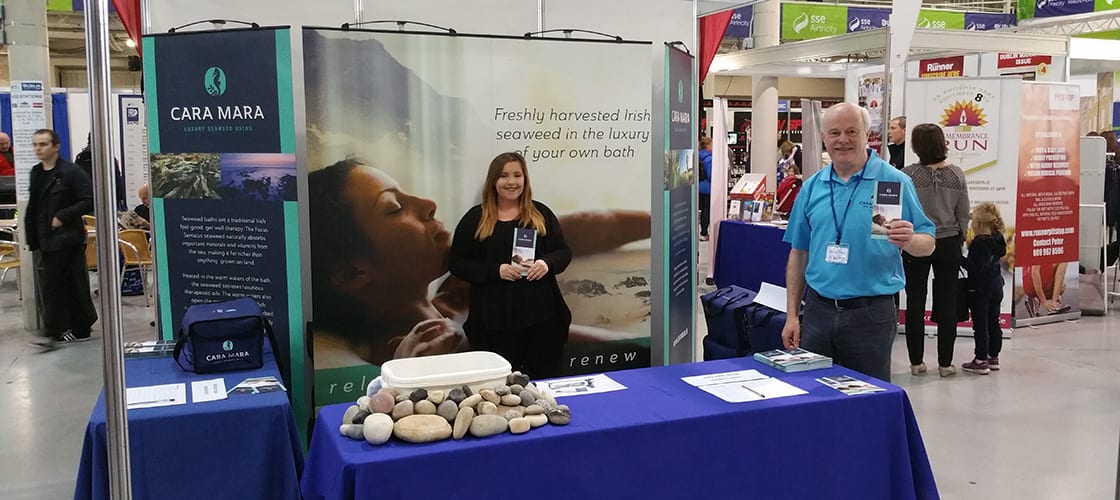
Trade shows and exhibitions are an invaluable opportunity that’s often underused by early-stage startups. However, it’s a mistake to view them solely as a sales tactic. In this blog, Richard Mc Manus looks at other reasons to exhibit at shows and fairs, the lessons he has learnt from attending some 40 events with his startup, and gives us a 25-step checklist for exhibition excellence!
You must be mad!
Unless you are selling food for the hungry or hurley sticks at the Ploughing, you do not make money at exhibitions. Since graduating from the New Frontiers programme in 2015 my start-up, Cara Mara luxury seaweed baths, has participated in around 40 exhibition events. I hope that many business owners and managers, especially of new businesses, can learn from my experience.
Some of my fellow exhibitors have cried after the event because they did not get a single sale. Recently, I heard one high profile startup entrepreneur tell how he spent €10,000 on a single event, had negligible sales and managed to wipe out his cash reserves.
Why exhibit at trade fairs?
To build initial public awareness of Cara Mara – which sells a home seaweed bath product – we exhibited at a range of fairs. This included exhibitions tied in with sport, health, business, as well as summer shows. Yes, they did create a certain level of awareness, but they never generated high volume sales. Truthfully, it was a mistake to have even attended some of them. The lesson I took from this is that it is essential to ask yourself two questions when planning to attend an event:
- Will your target customer group(s) be at the exhibition?
- Will they be buying?
Here’s how we experienced the different events we exhibited at, and the level of interest a product such as ours could typically attract:
- Sports events: participants are completely absorbed in their preparation and recovery (e.g. running, cycling, etc.) and then socialising with their friends afterwards.
- Business seminars/exhibitions: attendees are mainly interested in the conference talks and then socialising and networking during the breaks. Exhibition stands are almost a distraction.
- Summer shows: visitors are mainly interested in being entertained by animal demonstrations, live music stage shows, and a summer day out to meet friends old and new.
The best exhibitions are those which people attend because they have a specific need to address, and they intend to buy. In my case good examples included:
- Taste of Monaghan, Taste of Cavan, etc. Yes, these provincial events include non-food products and services.
- Wellfest. Attendees were specifically seeking ways to enjoy life and improve health.
Think awareness rather than sales
Most businesses, whether they are selling to business or the general public, will have specific exhibitions where their target customers will attend and hang out. It’s essential to research such events to make sure they are right for you.
What does the word ‘exhibit’ even mean?
“To publicly display, show, present, demonstrate, showcase.”
So unless you’re one of those food vendors or hurley stick sellers mentioned above, exhibitions are mainly for creating customer awareness! You’re making a connection in anticipation of future transactions. But remember that consumers are busy people and easily forget you, unless you are in front of them on a consistent, regular basis.
Exhibit with excellence – a checklist of 25 steps
This is my 25-step recipe for a successful exhibition strategy.
Research
- Check out the exhibition the year before you expect to attend – i.e. visitor profiles, traffic flow, etc.
- If that isn’t possible, check out the organiser’s website to see who exhibited last year. Phone those exhibitors and ask how they got on and what advice they would offer.
- Cost benefit – decide what your objectives are and write them down. Are the expected benefits worth the cost (stand costs, staff, travel, accommodation, meals, extras)?
- Grants – perhaps you could leverage funding to help with costs? Are there any business development/export grants you could apply for?
Dealing with organisers
- Try to get a discount on the cost of a stand. Explain that you are a startup, you are on the books of your local LEO or an Enterprise Ireland client, or perhaps that you are a first time exhibitor at this particular event and you’re not sure it is for you. Always seek a discount, most commercial organisers are flexible on price.
- Consider waiting to the last moment to get a discount price for late cancellations/organisers seeking to fill exhibition hall.
- Payment: delay to latest date possible and pay in instalments. I suffered a significant bad debt when an event was cancelled and the organiser went into liquidation.
 Stand preparation
Stand preparation
- Traffic flow: check out or anticipate the visitor flow in the exhibition hall. There is no point in taking the cheapest stand if it’s at the quietest part of the hall.
- Positioning: the best stand pitches are at corners (you gain exposure from two directions) and the end of aisles (visitors can directly see you as they approach). Ask for them.
- Be professional: your stand backdrop, exhibition table, and product display need to reflect quality and grab visitors’ attention. It needs to say “I’m interesting. Check me out.” There are many excellent display providers, but I particularly like focusonline.ie.
Exhibition preparation
- Checklist: prepare in advance to avoid any shortcomings
a) Equipment, brochures, and leaflets for the stand
b) Product for the stand
c) Staffing
d) Times: opening, closing, set up. Organise logistics to get there on time
e) Insurance: make sure you have adequate public liability cover - Social media: spread awareness and make a noise about the event in advance. If you tag the organisers, they will usually re-post your communications.
- Customer communications: if you are a B2B business, write to your existing customers and prospects inviting them to the exhibition/your stand. Provide them with free entrance tickets as appropriate.
- Dress code: depends on your industry/business/culture, wear suits, branded t-shirts, name tags, etc.
Showtime
- Fellow exhibitors: remember they may be potential customers! Talk to them and ask what exhibitions work well for them. They are a treasure of knowledge and experience.
- Be passionate. Enjoy yourself. Make friends.
- Pep in your step: always stand ready to engage with people. Sitting at the stand is a big No No! Get in shape in advance by getting sufficient sleep and enjoy a healthy energy diet.
- Engage: some people are naturally shy and may avoid your stand or walk by with eyes averted. You have to be active. Stand out in the aisle. Say hello. Draw people in with a leaflet or an engaging question. Most people love it when you give them time and needed information.
- Interesting product demo: this is always a winner (live or on video). Help customers to dream and think ‘Yes, this is for me!’.
- Special prices: visitors nowadays expect special reduced prices for exhibitions, fairs, etc. Don’t disappoint them. Make sure there is a price list on display.
- Eyes, ears, and mind wide open: observe what’s happening, what’s working, and what’s not working. Learn, change, and do better.
- Build an email list: visitors love to leave their name and email address if there is a prize on offer. It could be your own product or something attractive (e.g. tickets for an event or a weekend away).
Post-event review
- Follow up: with all new contacts and on all promises made – within a few days.
- Email list: if you collected a list, your first communication should be within a week. Its focus should be to thank, to educate, to entertain, and not a hard sell. At the end, you could perhaps extend the special exhibition prices for a limited period, as an exclusive offer.
- Learn: talk to your colleagues. Talk to yourself. Compare all the outcomes with the initial written objectives – level of engagement, size of email list, revenue, costs, insights, important new contacts. What worked for you? What didn’t? How can you improve the next event?
Best wishes for your future success!
About the author

Richard Mc Manus
Richard Mc Manus is a New Frontiers alumnus and the founder of Cara Mara luxury seaweed baths. Richard qualified as a Chartered Accountant with PwC and has extensive experience in the manufacturing and export sector, working in both Finance Director and Managing Director roles.
While in the west of Ireland, he became familiar with the traditional Irish seaweed bath and its many wellness benefits. This experience led to the idea of bringing the therapeutic benefits of seaweed baths to a wider audience, and so Cara Mara was born. Richard’s mission is to bring the Cara Mara seaweed bath experience into people’s homes and lives, helping them to achieve balance and feel confident, relaxed, happy, and energised.
Recent articles
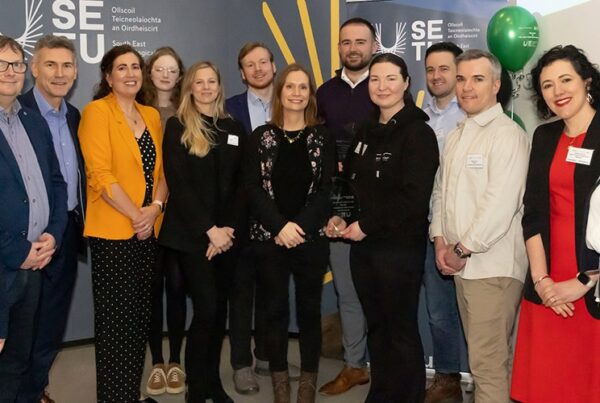
Founders Graduate From New Frontiers At South East Technological University – Carlow Campus

The New Frontiers Programme Connects 158 Founders With Success Stories

Raise Your Startup’s Visibility & Credibility By Entering These Competitions

Founder Perspectives: Lessons From Building Businesses In Sustainability

Tech Startups In The Age Of AI: Alumnus Paul Savage On Speed, Quality & Risk
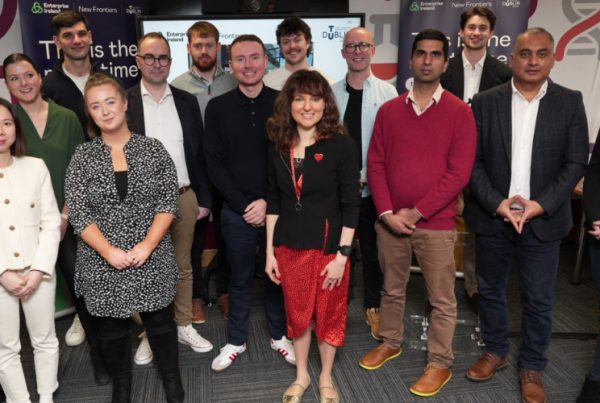
Fourteen Startup Founders Graduate From Phase 2 Of New Frontiers In Tallaght
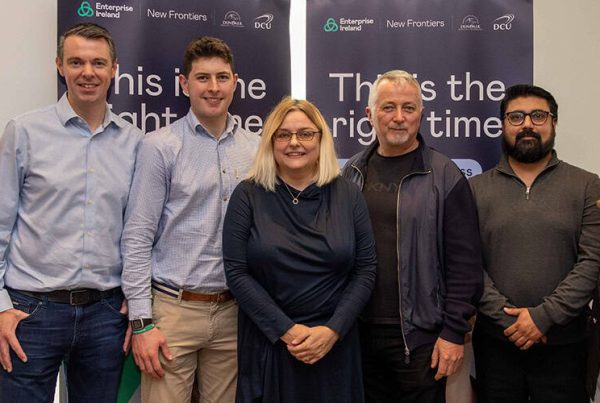
Eleven Founders Graduate From New Frontiers In The Border Mid-East Region

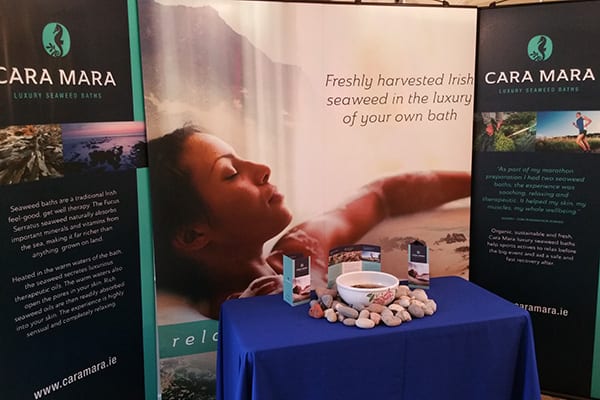 Stand preparation
Stand preparation
